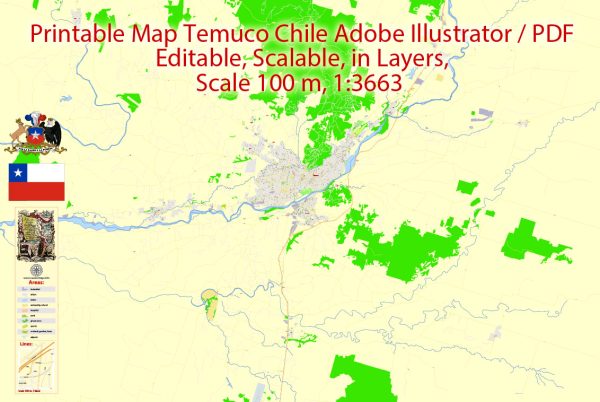Temuco is a city located in the southern part of Chile, in the Araucanía Region. It is known for its beautiful natural surroundings and has several ecological characteristics that make it an interesting place from an ecological perspective. Here is an ecological description of Temuco, Chile:
- Climate: Temuco experiences a temperate maritime climate with influences from the Pacific Ocean. This climate is characterized by mild temperatures throughout the year, with relatively high levels of precipitation, especially during the winter months. The city’s climate supports the growth of lush vegetation.
- Vegetation: The region around Temuco is covered in a variety of natural vegetation types. You can find temperate rainforests, including forests of native trees like coihue, ulmo, and manio. These forests are not only visually appealing but also provide habitat for a diverse range of wildlife.
- Biodiversity: The Araucanía Region, where Temuco is located, is known for its rich biodiversity. The region is home to various species of birds, mammals, and amphibians. Endemic species like the Kodkod (a small wildcat) and the Monito del Monte (an arboreal marsupial) can be found in the forests around Temuco.
- Lakes and Rivers: The city is situated near several lakes and rivers, including Lake Villarrica and the Cautín River. These water bodies support a range of aquatic life and offer recreational opportunities like fishing, boating, and swimming.
- Agriculture: Agriculture plays a significant role in the region’s economy. The fertile soils and favorable climate support the cultivation of various crops, including wheat, oats, and potatoes. There are also numerous fruit orchards, with apples, cherries, and blueberries being among the popular fruits grown.
- National Parks: Temuco serves as a gateway to several national parks and protected areas, such as Villarrica National Park and Huerquehue National Park. These areas offer opportunities for hiking, camping, and wildlife observation. They also provide a refuge for endemic and endangered species.
- Volcanoes: The city is surrounded by several volcanoes, with Villarrica being one of the most prominent. These volcanoes not only add to the scenic beauty but also play a role in the area’s geology and ecology.
- Conservation Efforts: Various organizations and government agencies work to protect the region’s natural resources and preserve its ecological integrity. Efforts include reforestation projects, habitat restoration, and wildlife conservation initiatives.
- Urban Green Spaces: Even within the city of Temuco, there are green spaces and parks that add to the ecological value. These areas provide opportunities for residents and visitors to connect with nature without leaving the city.
In conclusion, Temuco, Chile, is a city that is blessed with a diverse range of ecological features, including lush forests, diverse wildlife, abundant water resources, and a mild climate. The region’s ecological richness is an essential aspect of its identity and a draw for nature enthusiasts and tourists. Efforts to conserve and protect this environment are ongoing, making it a significant part of the city’s cultural and environmental heritage.


 Author: Kirill Shrayber, Ph.D. FRGS
Author: Kirill Shrayber, Ph.D. FRGS